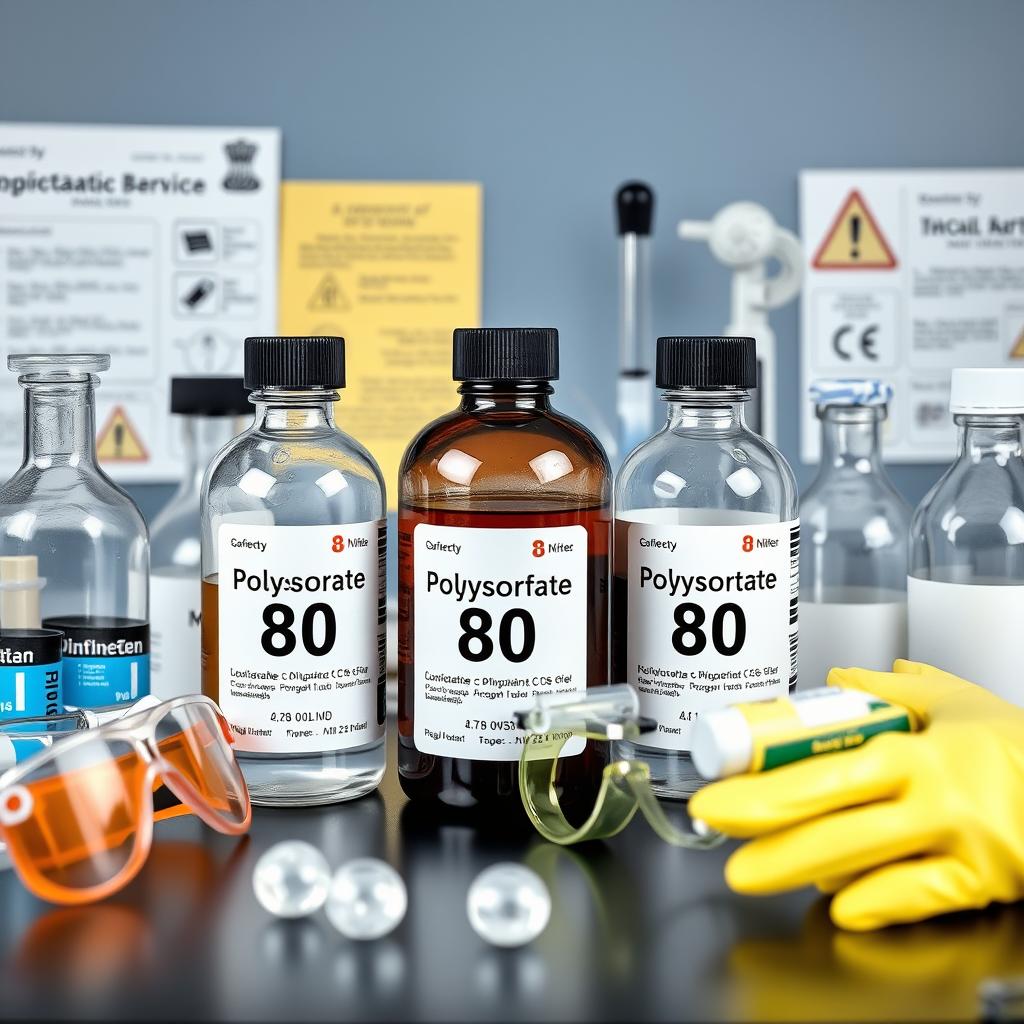Polysorbate 80 is a key ingredient in many foods like ice cream, baked goods, and drinks. It works as a food emulsifier and stabilizer. This makes food textures smoother and prevents them from separating. Polysorbate 80 is added to food to improve its quality and how long it lasts. It’s a vital ingredient in many recipes because of its emulsifying and stabilizing properties. But what is polysorbate 80, and why is it so common in food?
Click to use Silverigroup personal shopper services
Key Takeaways:
- Polysorbate 80 is used as a food additive to improve texture and prevent separation.
- It acts as a food emulsifier and food stabilizer in various food products.
- Polysorbate 80 is commonly used in ice cream, baked goods, and beverages.
- Its use as a food additive enhances the quality and shelf life of food products.
- Polysorbate 80 plays a crucial role in creating a smoother and more consistent texture in food products.
- It is a widely accepted and approved food additive by regulatory authorities.
Understanding Polysorbate 80: Basic Properties and Functions
Polysorbate 80 is a synthetic compound found in food, cosmetics, and medicines. It has a special structure that lets it mix with both water and oil. This makes it a great emulsifier. In skincare, polysorbate 80 is key. It helps mix oil and water, making products smooth and consistent. But, it’s important to know about its polysorbate 80 side effects.
Chemical Structure and Composition
Polysorbate 80 comes from polyethoxylated sorbitol and oleic acid. Its structure lets it work with both water and oil.
Click to buy citric acid from Silvairgroup
Key Properties as an Emulsifier
Polysorbate 80 is great at mixing oil and water. This is why it’s in so many products, like food, cosmetics, and medicines.
Common Trade Names and Forms
It’s also known as Tween 80. Polysorbate 80 is in many products and comes in different forms, like powders and liquids.
Knowing how polysorbate 80 works is important. It helps us understand its polysorbate 80 side effects and benefits in polysorbate 80 in skincare. This way, we can use it wisely in our products.
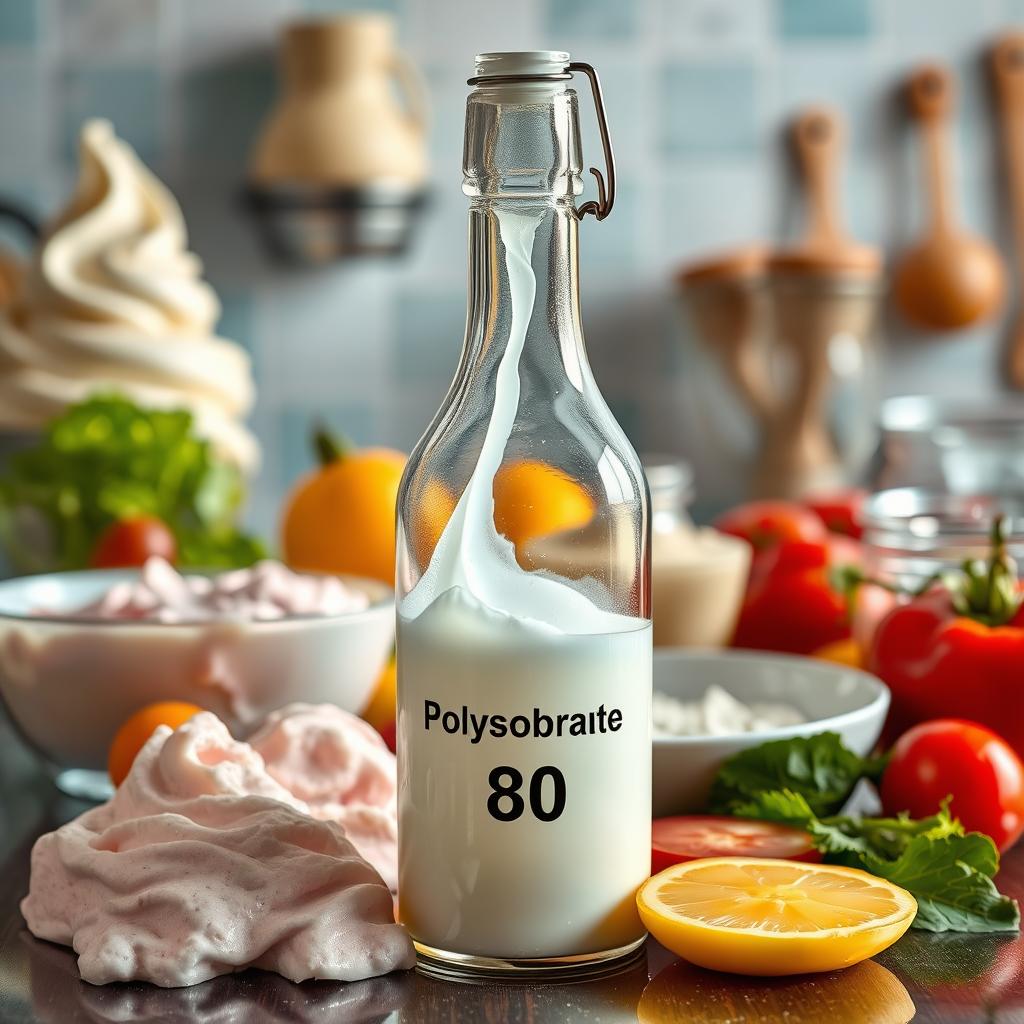
The Science Behind Why Polysorbate 80 is Used as a Food Additive
Polysorbate 80 is a common food additive. It improves texture and prevents separation in various products. The science behind its use is based on the molecule’s ability to mix oil and water. This creates a stable emulsion, which is key for many food products.
Research has shown that Polysorbate 80 is generally safe for eating. But, there are some worries about its potential polysorbate 80 toxicity and side effects. To address these, regulatory agencies have set guidelines for its use in food. Using Polysorbate 80 as a food additive has several benefits:
- It improves texture and stability in emulsions.
- It enhances flavor and aroma in food products.
- It increases the shelf life of products due to its preservative properties.
In conclusion, Polysorbate 80 is used in food because it improves texture and prevents separation. Despite some concerns about toxicity, guidelines ensure its safe use.
| Food Product | Role of Polysorbate 80 |
|---|---|
| Ice Cream | Stabilizes mixtures of oil and water, improving texture |
| Baked Goods | Enhances flavor and aroma, extends shelf life |
| Beverages | Improves stability and texture, prevents separation |
Common Applications in Food Processing
Polysorbate 80 is a key ingredient in many food products because it helps mix ingredients together. It’s especially important in making ice cream and frozen treats. It keeps the texture smooth and stops ice crystals from forming. Looking for polysorbate 80 alternatives is important. In baked goods and sweets, it keeps them moist and soft. In drinks and liquids, it keeps the mix stable and prevents it from separating.
Ice Cream and Frozen Desserts
For these treats, finding a good substitute for polysorbate 80 is a challenge. But, scientists have created new options that work just as well. These alternatives help keep the texture smooth and creamy.
Baked Goods and Confectionery
In these items, polysorbate 80 helps them stay fresh longer. It’s a common ingredient, but people are looking for natural and eco-friendly alternatives. This is because they want to avoid using chemicals in their food.
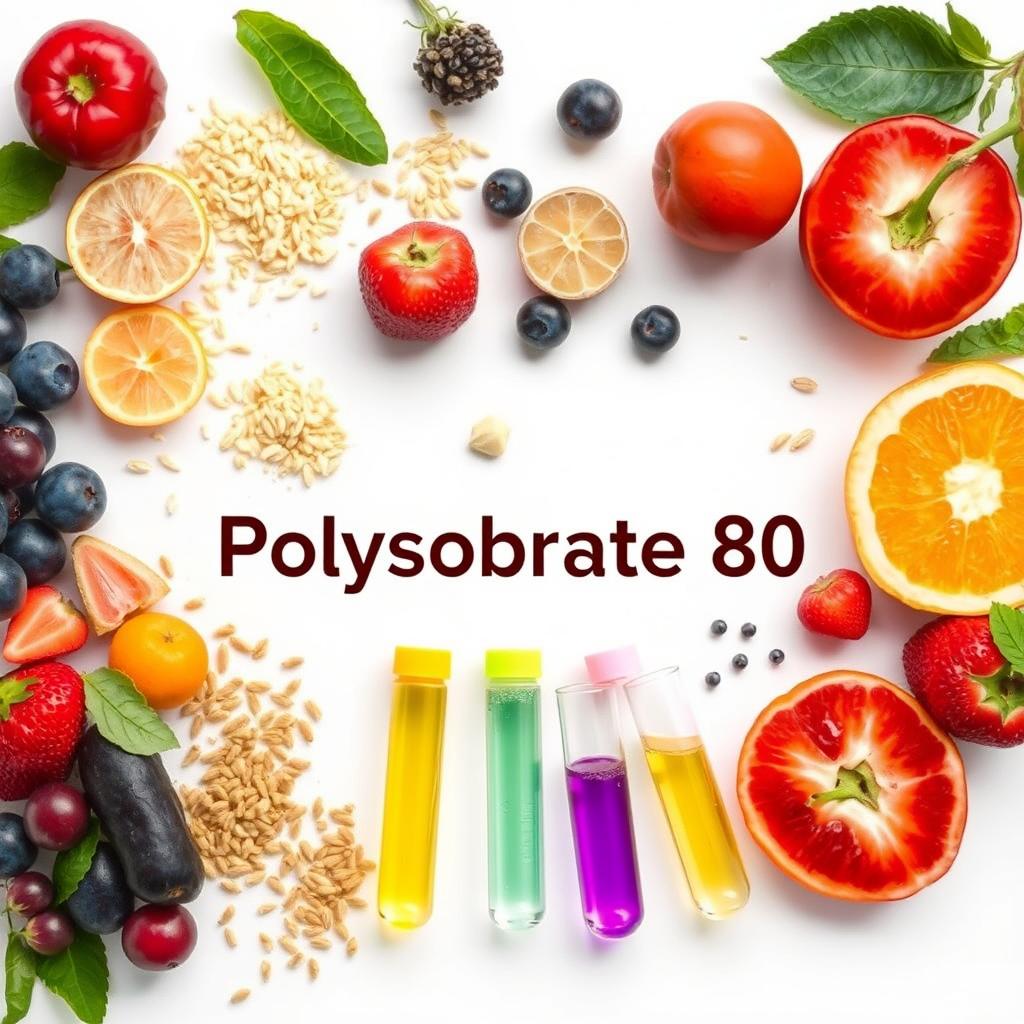
The food industry is always changing, and so is the need for new ingredients. Understanding polysorbate 80’s role in food is key. It helps in creating safer and more effective alternatives for different products.
Benefits and Advantages in Food Manufacturing
Polysorbate 80 is a versatile ingredient in food manufacturing. It acts as a food emulsifier, helping mix oil and water smoothly. This is key in making products like mayonnaise and salad dressings. It’s also a great food stabilizer. It keeps food products together, preventing separation. This is why it’s used in many food products.
Using Polysorbate 80 in food manufacturing has many benefits. These include:
- Improved texture and stability in food products
- Enhanced emulsification properties for mixtures of oil and water
- Increased shelf life and reduced separation in food products
Overall, Polysorbate 80 is a valuable ingredient. It’s used as a food emulsifier and food stabilizer. It brings many benefits to food manufacturing.
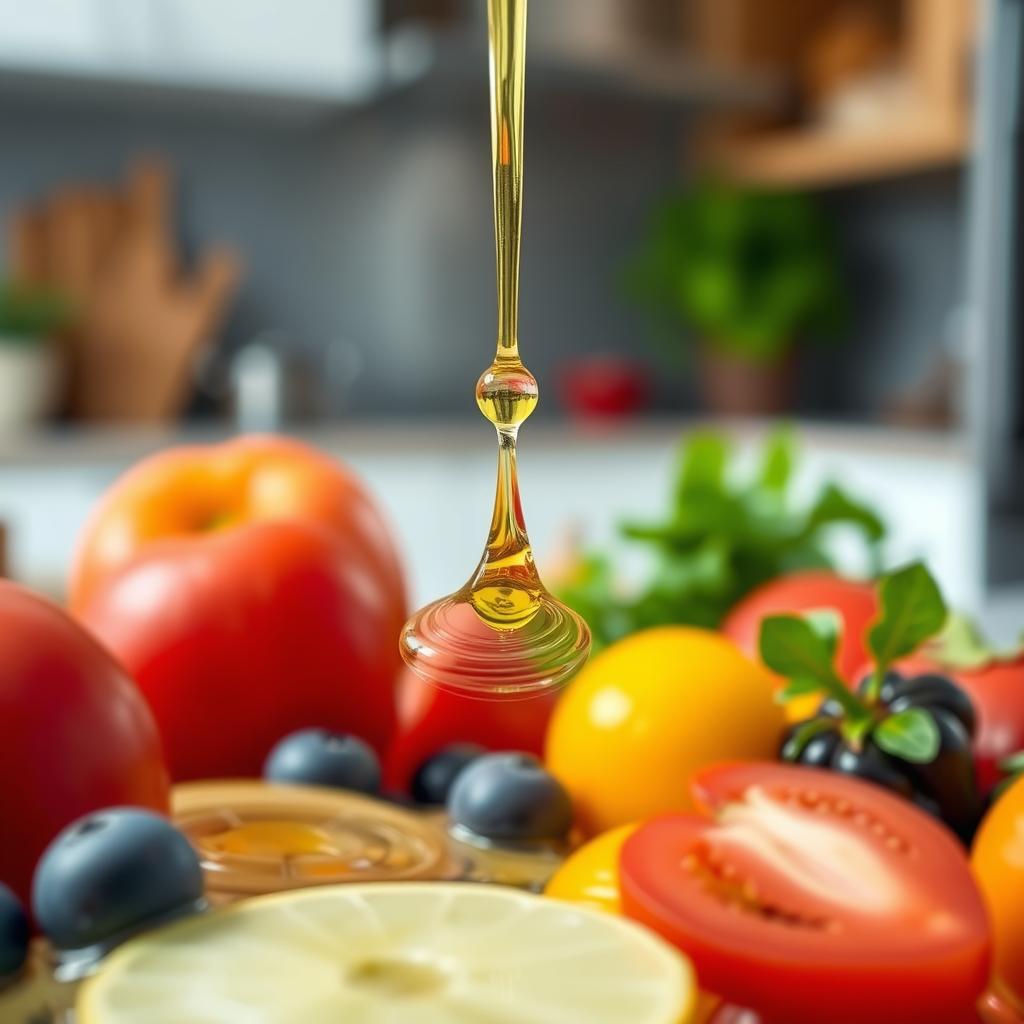
Safety Considerations and Regulatory Status
Polysorbate 80 is seen as safe by many regulatory bodies. The FDA has given it the green light for use in food. It’s also on the list of generally recognized as safe (GRAS) ingredients. This approval comes after careful review of its safety and potential risks. Studies show that too much polysorbate 80 can be harmful. But, the European Food Safety Authority has set a safe daily intake. This ensures that polysorbate 80 remains safe for everyone.
Regulatory Guidelines
- The FDA has guidelines for using polysorbate 80 in food.
- The European Food Safety Authority has set a safe daily intake for polysorbate 80.
- Other agencies, like the World Health Organization, also have rules for its use.
Overall, polysorbate 80 is safe to eat when we follow the rules. Even though there are some worries about its toxicity, the safe daily intake and guidelines help keep it safe for us.
| Regulatory Agency | Guideline |
|---|---|
| FDA | GRAS ingredient, approved for use as a food additive |
| European Food Safety Authority | Established ADI level for polysorbate 80 |
| World Health Organization | Provides guidelines for the safe use of polysorbate 80 |
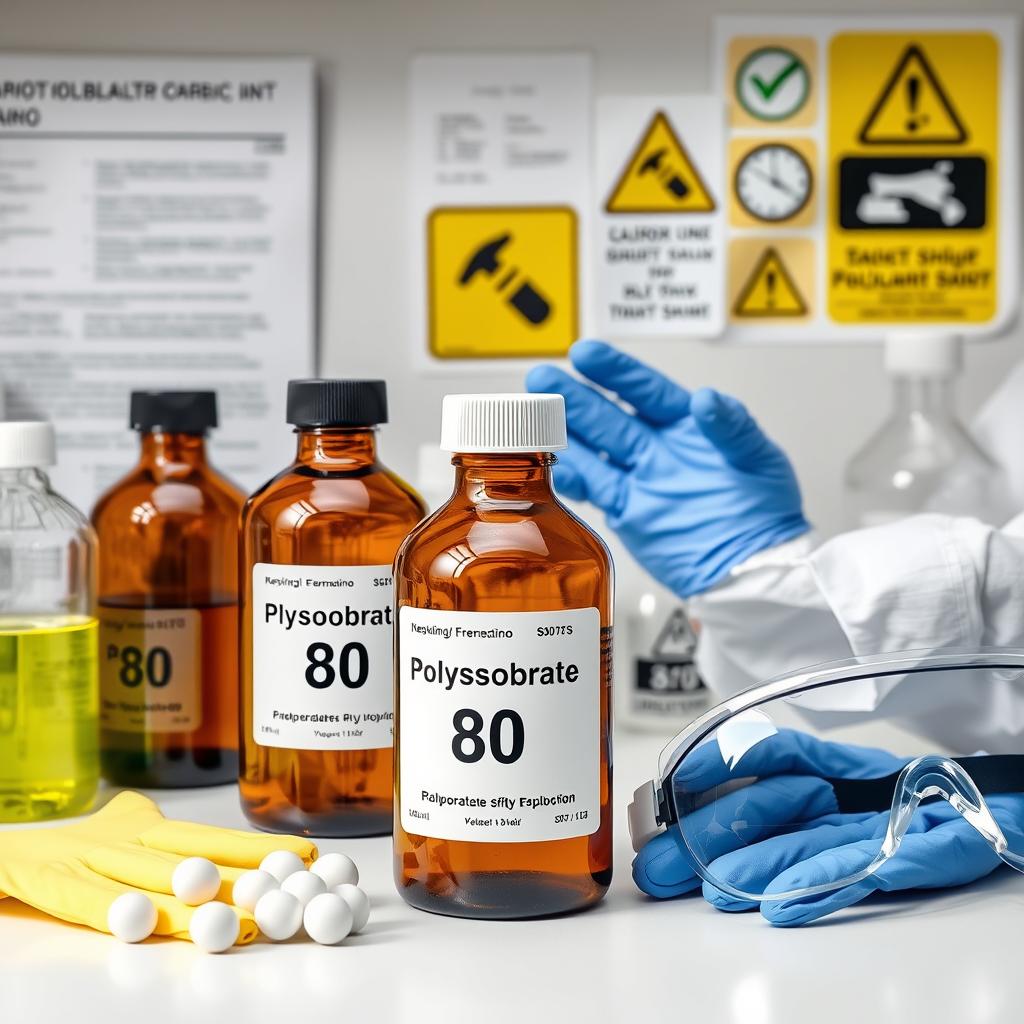
Potential Side Effects and Concerns
Polysorbate 80 is generally safe, but some people might experience stomach issues. These can include diarrhea, nausea, and stomach cramps. These side effects are usually mild and don’t last long. Research suggests polysorbate 80 could cause inflammation and oxidative stress. More studies are needed to understand its full impact. It’s important to know about these side effects and how to reduce them. Here are some key points:
- Gastrointestinal symptoms: diarrhea, nausea, stomach cramps
- Potential toxicity at high doses
- Inflammation and oxidative stress
The FDA has approved polysorbate 80 for food use, calling it safe. But knowing about side effects helps people make better choices for their health. By understanding and managing potential side effects, people can enjoy polysorbate 80 safely. This way, they can stay healthy and feel good.
| Potential Side Effect | Description |
|---|---|
| Gastrointestinal symptoms | Diarrhea, nausea, stomach cramps |
| Potential toxicity | High doses may cause adverse effects |
| Inflammation and oxidative stress | May cause long-term health problems |
Beyond Food: Other Industrial Applications
Polysorbate 80 is used in many areas beyond food. Its special properties make it useful in industries like pharmaceuticals, cosmetics, and manufacturing.
Pharmaceutical Uses
In the pharmaceutical world, polysorbate 80 helps drugs work better. It makes drugs easier for the body to absorb. This boosts their effectiveness.
Cosmetic Applications
In cosmetics, polysorbate 80 is key in creams and lotions. It keeps ingredients mixed well and improves texture. Some are looking into using other options instead.
Industrial Manufacturing
In manufacturing, polysorbate 80 is a surfactant and emulsifier. It’s used in textiles, paints, and coatings. Its ability to mix ingredients well is very helpful.
Natural and Synthetic Alternatives
Polysorbate 80 alternatives are gaining popularity in food and cosmetics. They can be natural or synthetic, offering many benefits. Common alternatives include lecithin, guar gum, and xanthan gum.
These options work well in food, cosmetics, and pharmaceuticals. For instance, lecithin, from soybeans or eggs, is used in chocolate and margarine. Guar gum and xanthan gum, found in ice cream and salad dressings, are also popular.
- Lecithin: a natural emulsifier derived from soybeans or eggs
- Guar gum: a natural thickening agent derived from the guar bean
- Xanthan gum: a natural thickening agent derived from the bacterium Xanthomonas campestris
Choosing the right polysorbate 80 alternative is key. It depends on the product’s needs and desired effects. This way, manufacturers can make safe, effective, and sustainable products.
Conclusion: The Future of Polysorbate 80 in Food Production
The food industry is always changing, and Polysorbate 80 is set to stay a key food additive and emulsifier. It’s great at mixing and keeping ingredients stable. This makes it essential in many foods, like ice cream, baked goods, beverages, and salad dressings.
Even though some worry about its side effects, health groups say it’s safe when used right. But, more people want natural and organic foods. This might lead to new alternative emulsifiers and stabilizers. These could be from plants or natural sources. They might work just as well as Polysorbate 80 but without the synthetic concerns. As the search for these alternatives grows, Polysorbate 80 might need to adapt to stay important in food making.
FAQ: How and why Polysorbate 80 is used as a food additive
What is Polysorbate 80 and how is it used as a food additive?
Polysorbate 80 is a common food additive found in ice cream, baked goods, and drinks. It improves texture and prevents separation. This makes it a key ingredient in many foods.
What are the basic properties and functions of Polysorbate 80?
Polysorbate 80 is made from sorbitol and oleic acid. It has a part that loves water and another that loves fat. This lets it mix oil and water well.
How does the science behind Polysorbate 80 support its use as a food additive?
Polysorbate 80 works by improving texture and preventing separation. It mixes with oil and water, creating a stable mix. This is thanks to its unique structure.
In what common food products is Polysorbate 80 used?
Polysorbate 80 is in ice cream, baked goods, drinks, and salad dressings. It makes ice cream smooth and prevents ice crystals. It also keeps baked goods moist and dressings stable.
What are the benefits and advantages of using Polysorbate 80 in food manufacturing?
Polysorbate 80 stabilizes oil and water mixtures, making textures smooth. It’s crucial in mayonnaise and dressings. It also prevents separation and improves texture in many foods.
Is Polysorbate 80 considered safe for consumption?
Yes, Polysorbate 80 is safe for eating, says the FDA and the European Food Safety Authority. It’s approved for use in foods and has a safe daily intake level.
What are the potential side effects and concerns associated with Polysorbate 80?
Some people might get diarrhea, nausea, or stomach cramps from Polysorbate 80. There’s also worry about its toxicity at high doses. Some studies link it to inflammation and oxidative stress.
What are the natural and synthetic alternatives to Polysorbate 80?
Alternatives include lecithin, guar gum, and xanthan gum. These are used in foods, cosmetics, and medicines. Lecithin is from soybeans or eggs, and is in chocolate and margarine.
What is the future of Polysorbate 80 in food production?
Polysorbate 80 is key in food production, used in many products. It’s safe but there are concerns. As the food industry grows, Polysorbate 80 will likely stay important. Natural and synthetic alternatives might also become more common.

